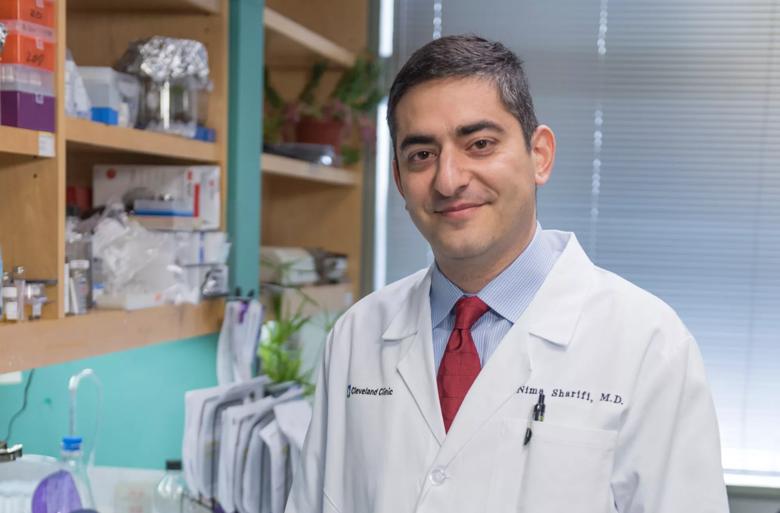Laboratory findings may spur new approach for those resistant to current therapies
Cleveland Clinic News Service | 216.444.0141
We’re available to shoot custom interviews & b-roll for media outlets upon request.
CCNS health and medical content is consumer-friendly, professional broadcast quality (available in HD), and available to media outlets each day.

A Cleveland Clinic research team has uncovered a biological pathway that renders a common prostate cancer drug useless and, for the first time, restored the drug’s cancer-killing power in human prostate cancer tumor cells grown in mice.
Results from the study were published online today in the medical journal, eLife.

Image content: This image is available to view online.
View image online (https://assets.clevelandclinic.org/transform/c4e11100-eb8a-496e-82dc-678cab3b0069/Sharifi-crop-for-web_jpg)
Nima Sharifi, M.D.
Resistance to prostate cancer drugs is a common clinical problem that many patients and their oncologists face. While standard therapies like androgen deprivation (or “medical castration”) can be effective for advanced prostate cancer, they typically stop working at some point, and the disease continues to progress. When medical castration fails, patients are often then treated with a potent drug called enzalutamide to block the tumor’s male hormones. Unfortunately, enzalutamide does not work indefinitely, and tumors eventually become resistant to it as well.
Within prostate tumor cells, male hormones (androgens) bind to and activate an androgen receptor protein. This hormone-receptor complex then instructs the cell to flourish and proliferate. Enzalutamide – an androgen receptor blocker – blocks this interaction so that tumors androgens are no longer active.
The team, led by Cleveland Clinic’s Nima Sharifi, M.D., uncovered a complex cascade of events – a “metabolic switch”– that occurs when androgen receptors are blocked with enzalutamide. Results showed that enzalutamide treatment causes levels of an enzyme called 11βHSD2 to plummet, which creates a surplus of the stress hormone cortisol in the tumor cells. This extra cortisol activates its own receptor protein complex, which then takes on the role of the disabled androgen receptor, instructing the cancer cells to make more androgens.
Since simply blocking cortisol from its receptor is not compatible with life, Dr. Sharifi’s team searched for alternative means of turning off this metabolic switch. Remarkably, they found that restoring levels of 11βHSD2 reversed enzalutamide resistance.
“This major discovery demonstrates that tweaking the metabolism induced by cancer drugs can have major benefits to patients in prostate and possibly other cancers,” Dr. Sharifi said. “We need more studies to determine how to safely increase 11βHSD2 in patients, but we are a step closer to finding answers and hopefully prolonging the lives of men who are in the unfortunate situation of being resistant to all current therapies.”
Dr. Sharifi is on the medical staff in Cleveland Clinic’s Lerner Research Institute Department of Cancer Biology, Glickman Urological & Kidney Institute, and Taussig Cancer Institute. He also holds the Kendrick Family Endowed Chair for Prostate Cancer Research and was recently named a 2016 Harrington Fellow by University Hospitals’ Harrington Discovery Institute.
The research was supported by the National Cancer Institute (R01CA168899, R01CA172382, and R01CA190289), the Prostate Cancer Foundation, and the American Cancer Society. The funders had no role in the study’s design, data collection and interpretation, or the decision to submit the work for publication.
Cleveland Clinic is a nonprofit multispecialty academic medical center that integrates clinical and hospital care with research and education. Located in Cleveland, Ohio, it was founded in 1921 by four renowned physicians with a vision of providing outstanding patient care based upon the principles of cooperation, compassion and innovation. Cleveland Clinic has pioneered many medical breakthroughs, including coronary artery bypass surgery and the first face transplant in the United States. Cleveland Clinic is consistently recognized in the U.S. and throughout the world for its expertise and care. Among Cleveland Clinic’s 82,600 employees worldwide are more than 5,786 salaried physicians and researchers, and 20,700 registered nurses and advanced practice providers, representing 140 medical specialties and subspecialties. Cleveland Clinic is a 6,728-bed health system that includes a 173-acre main campus near downtown Cleveland, 23 hospitals, 280 outpatient facilities, including locations in northeast Ohio; Florida; Las Vegas, Nevada; Toronto, Canada; Abu Dhabi, UAE; and London, England. In 2024, there were 15.7 million outpatient encounters, 333,000 hospital admissions and observations, and 320,000 surgeries and procedures throughout Cleveland Clinic’s health system. Patients came for treatment from every state and 112 countries. Visit us at clevelandclinic.org. Follow us at x.com/CleClinicNews. News and resources are available at newsroom.clevelandclinic.org.
Editor’s Note: Cleveland Clinic News Service is available to provide broadcast-quality interviews and B-roll upon request.